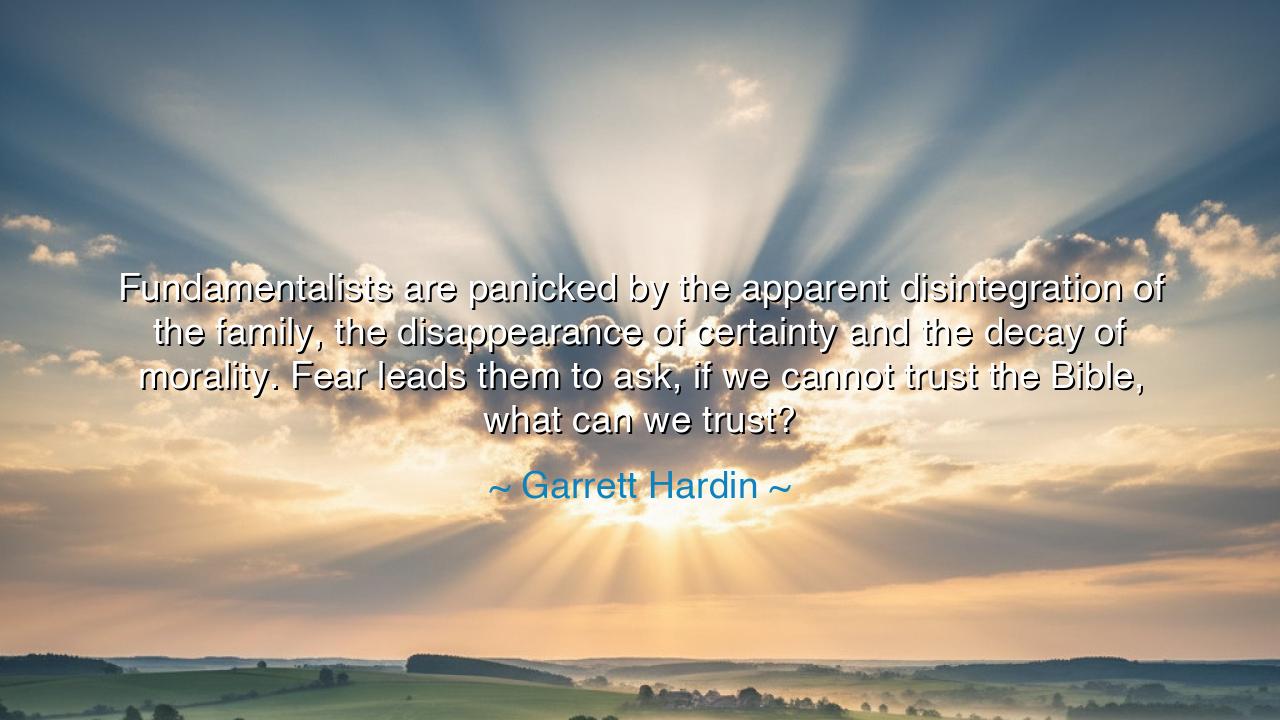
Fundamentalists are panicked by the apparent disintegration of
Fundamentalists are panicked by the apparent disintegration of the family, the disappearance of certainty and the decay of morality. Fear leads them to ask, if we cannot trust the Bible, what can we trust?






In the words of Garrett Hardin, “Fundamentalists are panicked by the apparent disintegration of the family, the disappearance of certainty and the decay of morality. Fear leads them to ask, if we cannot trust the Bible, what can we trust?” These words are not spoken lightly, for they address the very foundations upon which civilizations rest: family, order, morality, and faith. Hardin observes that when these pillars begin to tremble, those who cling most tightly to tradition feel their world collapsing, and so they turn in desperation to the one authority they believe cannot be shaken—the Bible.
The meaning here is layered. Hardin is not merely criticizing religion; he is revealing the power of fear in shaping human behavior. When old certainties fall away, when the customs of ancestors seem to erode under the tide of modern life, people grasp for something fixed, unchanging, eternal. For the fundamentalist, the sacred text becomes the anchor in stormy seas, the fortress against chaos. To question it is, to them, not merely an intellectual exercise, but a threat to their very survival.
History bears witness to this pattern. In the time of the Protestant Reformation, when the authority of the Catholic Church crumbled across Europe, fear and fury gave rise to violence, wars of religion, and strict moral codes. Those who feared the loss of unity and certainty sought to bind their communities with ever tighter rules. In their eyes, without the certainty of scripture, there would be no compass, no direction, no hope. Fear, as Hardin observes, made them demand absolute trust in the written word, lest society fall into ruin.
Even outside religion, this principle holds true. When revolutions sweep away monarchies, when economic collapse destroys livelihoods, when wars tear apart nations, people instinctively cling to symbols of permanence. Some cling to sacred texts, others to flags, leaders, or ideologies. The root is the same: a longing for certainty when the ground beneath is shaking. Hardin’s observation shows that it is not only faith in God at stake, but faith in stability itself.
Yet the wisdom of his words lies also in their implicit warning. When fear drives people to demand unthinking trust in a single authority, they may close their ears to reason, compassion, and change. The Bible—or any text, creed, or system—when elevated beyond question, can become not a guide but a prison. True strength of spirit is not the refusal to question, but the courage to seek truth, even when it unsettles. For certainty, though comforting, may be an illusion, while growth requires openness to change.
The lesson, then, is not to scorn those who fear, but to understand their plight. We must see how deeply people need meaning, stability, and moral direction. If those needs are ignored, fear will harden into fanaticism. The wise course is to meet fear with compassion, to offer new ways of grounding morality and family, not through blind adherence, but through shared values of justice, love, and responsibility.
Practically, this means asking ourselves: upon what do we build our trust? If the old certainties crumble, do we collapse with them, or do we seek new foundations—reason, empathy, wisdom, community—that can stand the test of time? Let us not be ruled by fear, but by courage; not by blind trust in what cannot be questioned, but by conscious trust in principles that unite and uplift. In this way, we honor the longing for stability while guiding it toward a truth that is both enduring and alive.
Thus Hardin’s words resound as both observation and challenge: fear may drive men to cling desperately to certainty, but wisdom teaches us to find trust not in rigidity, but in values that can grow with humanity itself. Let us then live not as prisoners of fear, but as builders of trust, grounded not in panic, but in understanding.






THTran Thanh Ha
This quote by Hardin makes me reflect on how fear can drive people to seek security in old systems, like the Bible. The perceived decay of morality and family can feel overwhelming, but is it possible that this fear overlooks the positive changes that are also occurring in society? Could it be that embracing change rather than resisting it could lead to a more just and adaptable world?
TTThu Thao
Hardin’s statement touches on something much deeper about human nature – the fear of change and the desire to cling to something solid like religion. The question, ‘if we cannot trust the Bible, what can we trust?’ implies that without a clear moral compass, everything becomes uncertain. But is it possible to build trust in a more flexible, dynamic way? Could evolving moralities lead to a more inclusive and compassionate society?
VTVan Tien
This quote makes me think about how fundamentalism often relies on absolute certainty, especially in times of uncertainty. Hardin’s point that fear leads to questions about trust in the Bible is intriguing. Is it possible for people to find meaning in life without relying on rigid belief systems? How does society balance the need for moral guidance with the evolving nature of culture and ethics?
ANThai An Nhien
Garrett Hardin’s quote captures the deep sense of fear that some people feel when faced with societal changes. The panic over the disintegration of the family, the loss of certainty, and moral decay seems to stem from a desire for stability. But is this fear justified, or is it a reaction to changes that are natural and inevitable? How much does the need for certainty shape how people view the world?